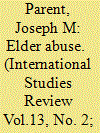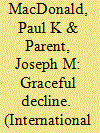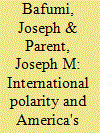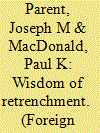|
|
|
Sort Order |
|
|
|
Items / Page
|
|
|
|
|
|
|
| Srl | Item |
| 1 |
ID:
142112


|
|
|
|
|
| Summary/Abstract |
Does neorealism offer a convincing account of great power balancing behavior? Many scholars argue that it does not. This conclusion rests on a misunderstanding of neorealist theory and an erroneous reading of the evidence. Properly specified, neorealism holds that great powers place an overriding emphasis on the need for self-help. This means that they rely relentlessly both on arming and on imitating the successful military practices of their peers to ensure their security. At the same time, they rarely resort to alliances and treat them with skepticism. There is abundant historical evidence to support these claims. Since 1816, great powers have routinely achieved an effective balance in military capabilities with their relevant competitors and promptly copied the major military innovations of the period. Case studies show that these outcomes are the product of states' efforts to ensure security against increasingly capable rivals. Meanwhile, the diplomatic record yields almost no examples of firm peacetime balancing coalitions over the past 200 years. When alliances have formed, great powers have generally doubted the reliability of their allies and of their opponents' allies. Thus neorealism provides a solid foundation for explaining great power balancing behavior.
|
|
|
|
|
|
|
|
|
|
|
|
|
|
|
|
| 2 |
ID:
089480


|
|
|
|
|
| Publication |
2009.
|
| Summary/Abstract |
Political scientists have long compared war to duelling in the hope that war could be abolished like duelling, that is, at the hands of a normative campaign. However, there has been limited investigation of duelling's past. What can the history of duelling teach us about the future of war? This paper advances two arguments. First, by refining the conventional wisdom, it argues that duelling's demise was caused less by normative campaigning than by the timing of industrialization. Second, it argues that although duelling is not an analogous institution to modern war, its ancestor, feuding, is. Writings on feuds contribute a complementary literature to the limited data on war, which is helpful for thought experiments and hypothesis testing. Further, feuding's fall was caused more by the growth of state capacity than by normative campaigning. In sum, neither the history of duelling nor that of feuding confirms the view that ideational factors played the principal role in suppressing these practices; therefore, we should reconsider how the abolition of war might occur.
|
|
|
|
|
|
|
|
|
|
|
|
|
|
|
|
| 3 |
ID:
105708


|
|
|
|
|
| Publication |
2011.
|
| Summary/Abstract |
Neorealists narrate their origins by explaining that classical realists committed a multitude of sins and were therefore displaced. The classics unscientifically explained world politics primarily through individual-level characteristics, typically a will to power that drove state behavior and international outcomes. In short, classical realism was inadequately structural and theoretical; thus, neorealists revised them by prioritizing structural factors and putting the paradigm on sound scientific footing. We argue that this narrative is generally incorrect. Classical realists were supremely structural and competently theoretical. Consequently, the realist tradition has much more continuity and richness than presently believed.
|
|
|
|
|
|
|
|
|
|
|
|
|
|
|
|
| 4 |
ID:
090712


|
|
|
|
|
| Publication |
2009.
|
| Summary/Abstract |
Joseph M. Parent compares Europe's hesitant steps toward unity with the successful unification of the United States. He finds that the reigning explanations of political integration are significantly limited, and urges policymakers and scholars interested in the European Union to consider an overlooked realist argument.
|
|
|
|
|
|
|
|
|
|
|
|
|
|
|
|
| 5 |
ID:
103652


|
|
|
|
|
| Publication |
2011.
|
| Summary/Abstract |
There is broad scholarly consensus that the relative power of the United States is declining and that this decline will have negative consequences for international politics. This pessimism is justified by the belief that great powers have few options to deal with acute relative decline. Retrenchment is seen as a hazardous policy that demoralizes allies and encourages external predation. Faced with shrinking means, great powers are thought to have few options to stave off decline short of preventive war. Contrary to the conventional wisdom, however, retrenchment is not a relatively rare and ineffective policy instrument. A comparison of eighteen cases of acute relative decline since 1870 demonstrates that great powers frequently engage in retrenchment and that retrenchment is often effective. In addition, we find that prevailing explanations overstate the importance of democracies, bureaucracies, and interest groups in inhibiting retrenchment. In fact, the rate of decline can account for both the extent and form of retrenchment, even over short periods. These arguments have important implications for power transition theories and the rise of China.
|
|
|
|
|
|
|
|
|
|
|
|
|
|
|
|
| 6 |
ID:
110201


|
|
|
|
|
| Publication |
2012.
|
| Summary/Abstract |
There is a growing consensus that the United States is undergoing a period of political polarization, particularly among elites. The causes of this polarization remain under-researched. We argue that shifts in the international distribution of power influence America's polarization. To demonstrate the argument, this article analyzes changes in power and polarization quantitatively and qualitatively from 1945 to 2005. A key finding is that greater relative power on the world stage substantially increases polarization and some of its correlates, like income inequality. The argument also measures the extent of international influence on domestic polarization and makes novel predictions on when and why polarization will fall.
|
|
|
|
|
|
|
|
|
|
|
|
|
|
|
|
| 7 |
ID:
107595


|
|
|
|
|
| Publication |
2011.
|
| Summary/Abstract |
The United States can no longer afford a world-spanning foreign policy. Retrenchment -- cutting military spending, redefining foreign priorities, and shifting more of the defense burden to allies -- is the only sensible course. Luckily, that does not have to spell instability abroad. History shows that pausing to recharge national batteries can renew a dominant power's international legitimacy.
|
|
|
|
|
|
|
|
|
|
|
|
|
|
|
|
|
|
|
|
|